Everyone is different. And so are their personalities. When writing about them, it is important to accurately and most appropriately describe their nature and personalities. Thankfully, we have ‘Personality Adjectives’ in English to help us out.
Known as describing words, Personality Adjectives help us describe/ understand a person much better. You use them to describe whether a person is good or bad, fast or slow, happy or sad, easygoing or challenging to handle, and much more.
They make writing more exciting and help us paint a perfect picture of a person using fewer but impactful words.
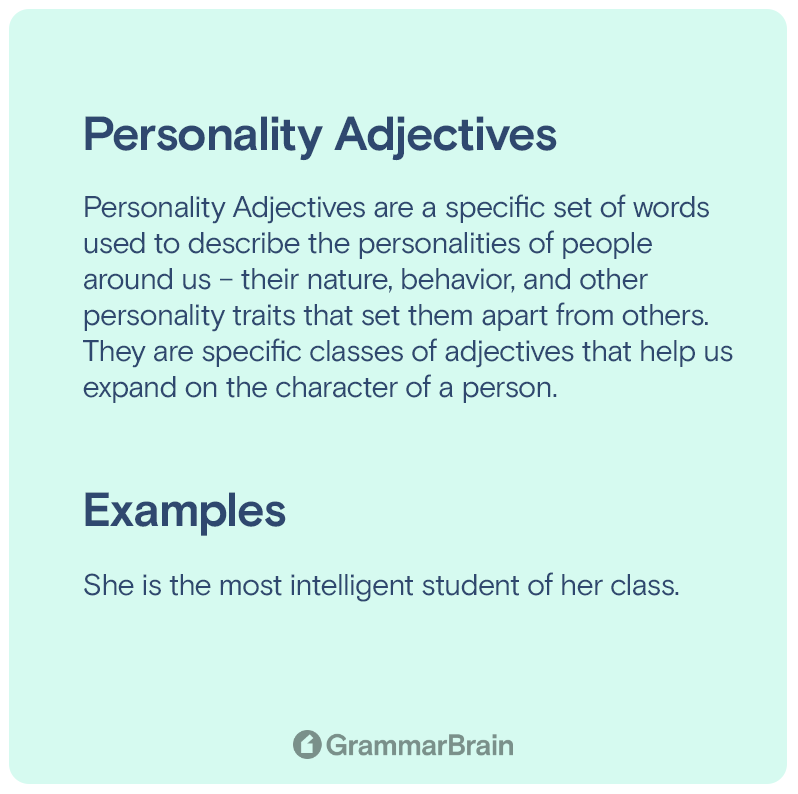
What Are Personality Adjectives?
Personality Adjectives are a specific set of words used to describe the personalities of people around us – their nature, behavior, and other personality traits that set them apart from others. They are specific classes of adjectives that help us expand on the character of a person.
For example:
- This is my friend.
- This is my clever, witty and cheerful friend.
Here the words clever, witty, and cheerful are used to describe a friend’s personality. They help the reader better understand the traits or qualities of a person.
Let’s look at another example:
- She is the most intelligent student of her class.
Here the word ‘most intelligent’ is an adjective that is being used to describe the personality of a student. It suggests that no student in her class is as intelligent as her.
Personality adjectives can be used to create both a positive and negative image of a person. They are strong, powerful words that help readers form an option about a person and thus should be chosen wisely.
How do they differ from regular adjectives?
Words used to describe a person, place, or thing are called Adjectives.
Adjectives are of many types and are used to express an attribute of something. They may or may not describe the personality of the object or person in question.
For example:
- He has a big square box.
- She wore a pretty dress.
- Ben has few friends.
Here, big, pretty, and few are all adjectives but they describe the object’s personality.
Now take a look at these examples:
- He is an arrogant man.
- Elina is a wonder kid.
- Mark is a hard-working employee.
Here arrogant, wonder and hard working are also adjectives, but since they are used to describe a person’s personality, they are known as Personality Adjectives.
Positive personality adjectives
Adjectives used to describe a person’s positive character or trait are known as Positive Personality Adjectives. You can use them to portray someone in a positive light and make the person feel extra special.
They come in handy when you want to describe people you love, admire, or want to impress. They also help you describe yourself and/or make a meaningful impact in front of others.
For example:
- She is a brave girl.
- Tom is very intelligent.
- He is an honest employee.
- I am a sincere student.
Here, brave, intelligent, honest, and sincere are all used to demonstrate the positive characteristics of people and are hence known as Positive Personality Adjectives.
Warm, friendly, polite, charming, hard-working, generous, loving, and funny are all examples of Positive adjectives.
Other Positive Personality Adjectives include:
- Active
- Extrovert
- Modest
- Sensitive
- Adaptable
- Exuberant
- Motivated
- Social
- Adventurous
- Fearless
- Nice
- Shy
- Affectionate
- Faithful
- Neat
- Silly
- Ambitious
- Frank
- Non-judgmental
- Smart
- Brave
- Funny
- Optimistic
- Straight-Forward
- Bright
- Forceful
- Organized
- Sympathetic
- Beautiful
- Friendly
- Observant
- Thoughtful
- Broad-minded
- Good
- Patient
- Tidy
- Calm
- Gentle
- Passionate
- Talkative
- Careful
- Giving
- Persistent
- Trustworthy
- Cheerful
- Generous
- Polite
- Tough
- Courageous
- Gregarious
- Practical
- Understanding
- Compassionate
- Helpful
- Placid
- Upbeat
- Communicative
- Hardworking
- Popular
- Versatile
- Considerate
- Humorous
- Powerful
- Wise
- Courteous
- Honest
- Pro-active
- Warmhearted
- Creative
- Happy
- Quiet
- Wild
- Diligent
- Hilarious
- Quick-witted
- Wise
- Diplomatic
- Intuitive
- Rational
- Witty
- Determined
- Intelligent
- Reserved
- Dynamic
- Independent
- Reliable
- Empathetic
- Joyful
- Romantic
- Emotional
- Kind
- Reasonable
- Easy-going
- Loving
- Rational
- Energetic
- Lucky
- Resourceful
- Efficient
- Loyal
- Sincere
- Enthusiastic
- Mature
- Sensible
To learn more about Positive Personality Adjectives, their meaning, and use in sentences, check out our table below.
Negative personality adjectives
Words that are used to describe the negative personality of a person are called Negative Personality Adjectives. They should be used cautiously as they can make a person look bad.
- Ben is very arrogant.
- She is impolite and grumpy.
- Jenny is a selfish girl. She never helps anyone.
Here, arrogant, impolite, grumpy, and selfish are all examples of Negative Personality Adjectives as they describe the negative traits of people.
Other Negative Personality Adjectives include:
- Aggressive
- Dominating
- Humorless
- Loud
- Arrogant
- Dense
- Hostile
- Mean
- Apathetic
- Devious
- Hypocritical
- Manipulative
- Anxious
- Disloyal
- Impatient
- Moody
- Argumentative
- Disrespectful
- Impractical
- Narrow-minded
- Bossy
- Disorganized
- Humorless
- Nasty
- Boring
- Disruptive
- Hostile
- Nosy
- Boastful
- Demanding
- Hypocritical
- Obsessive
- Careless
- Egotistic
- Impatient
- Overcritical
- Callous
- Evasive
- Indiscreet
- Overemotional
- Childish
- Evil
- Inconsiderate
- Paranoid
- Clingy
- Fanatic
- Ignorant
- Possessive
- Cruel
- Foolish
- Irrational
- Pessimistic
- Coward
- Flaky
- Irresponsible
- Petty
- Cocky
- Forgetful
- Impulsive
- Prejudiced
- Controlling
- Frivolous
- Intolerant
- Pretentious
- Cynical
- Greedy
- Introvert
- Resentful
- Deceitful
- Grumpy
- Jealous
- Reckless
- Defensive
- Gossipy
- Judgmental
- Rude
- Dishonest
- Gullible
- Lazy
- Selfish
Check out our table below for meanings of these Negative Personality Adjectives and learn how to use them effectively in sentences.
Neutral personality adjectives
While most personality adjectives are either positive or negative, some are neutral – neither negative nor positive. Their meaning changes depending on how they are being used in the sentence. They are great when describing people you don’t know well enough or don’t want to offend.
For example:
- He is modern and straightforward.
Here, both modern and straightforward are neutral personality adjectives that can describe a person without being too judgmental.
Other neutral personality adjectives include:
- Anxious
- Enigmatic
- Modern
- Predictable
- Soft
- Ambitious
- Exuberant
- Mischievous
- Political
- Straightforward
- Busy
- Frank
- Modest
- Private
- Strict
- Breezy
- Frugal
- Moralistic
- Relaxed
- Tough
- Casual
- Folksy
- Noncompetitive
- Reflective
- Timid
- Chatty
- Forceful
- Neutral
- Reserved
- Uncompromising
- Childlike
- Impartial
- Noncommittal
- Rebellious
- Undemanding
- Complex
- Intense
- Ordinary
- Serious
- Unassuming
- Competitive
- Impressionable
- Outspoken
- Sensitive
- Unyielding
- Conservative
- Inhibited
- Opportunistic
- Sarcastic
- Quiet
- Decisive
- Introverted
- Perfectionist
- Shy
- Extravagant
- Irreverent
- Philosophical
- Silly
- Emotional
- Loud
- Persistent
- Steadfast
When to use personality adjectives
Personality adjectives have multiple uses in English and our everyday lives. They improve our vocabulary and help us understand human behavior much better.
Use personality adjectives to:
- Clearly understand or describe a personality trait
Personality adjectives come in handy when describing somebody’s nature, characteristics, or traits. Use them to describe a person’s behavior and how he/she is different from others.
They are used to praise someone or to explain why you don’t like them.
- Improve your own personality
Personality adjectives help understand personality traits and whether a particular kind of behavior is good or bad. They help inculcate positive traits right from early childhood and help us carve a good path in life.
- Amplify your communication skills
You also use them to describe yourself in resumes, applications, and during interviews. They help you leave a positive impact on others as well as increase your self-esteem.
So, keep a list of common adjectives handy all the time. It will help you improve your vocabulary, describe yourself and others easily, and make an impactful presence in front of your audience.
Words to Describe Someone
As mentioned above, having a strong vocabulary is extremely important in English. It improves communication and boosts self-confidence. But just knowing different words doesn’t make any sense if you don’t know their meaning or how to use them appropriately at different places while describing someone (their personality) or communicating with others.
For your ease, we have compiled a list of the top 70 personality adjectives you can use to create a positive or negative image of a person. Some of the most commonly used personality adjectives include:
- Beautiful
- Diligent
- Organized
- Shy
- Hardworking
- Tough
- Proactive
- Dynamic
- Boring
- Diplomatic
- Calm
- Adventurous
- Passionate
- Outspoken
- Witty
- Complex
- Mean
- Messy
- Loyal
- Discrete
- Humorous
- Greedy
- Untidy
- Frank
- Timid
- Energetic
- Polite
- Childish
- Manipulative
- Straightforward
- Fearless
- Bossy
- Enthusiastic
- Talkative
- Reserved
- Fanatic
- Generous
- Practical
- Emotional
- Private
- Stubborn
- Dishonest
- Disorganized
- Selfish
- Independent
- Joyful
- Dominating
- Reliable
- Wise
- Grumpy
- Sincere
- Resentful
- Modest
- Moody
- Mischievous
- Versatile
- Bad-tempered
- Humble
- Efficient
- Easygoing
- Rude
- Naughty
- Intelligent
- Obsessive
- Sensible
- Determined
- Loud
- Sooty
- Partial
- Impulsive
Examples of each word
Let’s see what these words mean, what their synonyms are, and how you can correctly use them in sentences through the following examples:
| Adjective | Type | Meaning | Example | Synonym |
| Beautiful | Positive Personality Adjective | Good looking | Annie is the most beautiful girl in the class. | Pretty, Attractive |
| Hardworking | Positive Personality Adjective | One who works very hard. | My dad is a very hardworking man. | Dedicated, Diligent |
| Boring | Negative Personality Adjective | Not interesting or exciting | He is such a boring man. | Dry, Dull, Uninteresting |
| Passionate | Positive Personality Adjective | Having strong will or feelings for something | Peter is a passionate learner. | Zealous, Ardent, Intense |
| Mean | Negative Personality Adjective | Not generous/ willing to give or share things | My roommate is very mean with her money. | Unkind, Cruel |
| Humorous | Positive Personality Adjective | Very funny | He is well known in the community for his humorous personality. | Amusing, Entertaining, Witty |
| Manipulative | Negative Personality Adjective | Tending to influence or control someone | He is smart, savvy, and intelligent, but also very manipulative. | Controlling, Dominating, Authoritative |
| Enthusiastic | Positive Personality Adjective | Very interested in something or excited by it | Mark is an enthusiastic golf player. | Keen, Eager, Passionate |
| Generous | Positive Personality Adjective | Kind, Helpful | He is a very generous man. | Kind-hearted |
| Timid | Negative Personality Adjective | Without much confidence | Kiaan is a timid child. | Shy, Fainthearted |
| Stubborn | Negative Personality Adjective | Very difficult to change | Rinne is so stubborn that she never admits that she is wrong. | Inflexible, Unbending, Intractable |
| Selfish | Negative Personality Adjective | Motivated by self-interest | He is too selfish to share his things with others. | Mean, Self-centred |
| Dominating | Negative Personality Adjective | Controlling | My grandfather has a dominating personality. | Controlling, Dictating, Commanding |
| Grumpy | Negative Personality Adjective | Irritable | He is a grumpy child. | Cranky, Unhappy, Ill-tempered |
| Modest | Positive Personality Adjective | Not extreme or excessive | He has been a modest man all his life. | Frugal, Ordinary, Limited |
| Versatile | Positive Personality Adjective | Having many skills | Sam is a versatile athlete. | Multi-faceted, Resourceful |
| Efficient | Positive Personality Adjective | Proficient in handling something | I am very efficient with my money. | Effective, Structured, Systematic |
| Naughty | Neutral Personality Adjective | Mischievous | He has always been a naughty child. | Disobedient, wicked |
| Sensible | Positive Personality Adjective | Reasonable and Practical | She is a sensible person and deals with problems wisely. | Rational, Stable, Balanced |
| Sooty | Negative Personality Adjective | Someone who thinks he/she has better taste or standard than others. | Myra and I don’t get along. She is too snooty to talk to. | Arrogant, Egoistic, Proud |
| Diligent | Positive Personality Adjective | Someone who works very hard | Leo is very diligent in his work. | Careful, Cautious |
| Tough | Neutral personality adjective | Strong | He always acts like a tough guy. | Powerful, Strong, Hard |
| Diplomatic | Positive Personality Adjective | Acting in a way that does not cause offence | He is very diplomatic in his dealings. | Tactful, Subtle, Prudent |
| Outspoken | Neutral personality adjective | Honest, Straight-forward | He is an independent and outspoken critic of politics. | Unreserved, Upfront, Candid |
| Messy | Negative Personality Adjective | Untidy, Disorganized | I don’t like Maria. She is a messy girl. | Shabby, Untidy, Grubby |
| Greedy | Negative Personality Adjective | Having an excessive desire for something | He is an arrogant and greedy businessman. | Insatiable, Hungry, Selfish |
| Energetic | Positive Personality Adjective | Full of energy | Children are energetic workers. | Active, Strong, Determined |
| Straightforward | Positive Personality Adjective | Direct | She is blunt and straightforward | Honest, Open, Genuine |
| Talkative | Positive Personality Adjective | One who talks too much | Nipsy is the most talkative girl in the class. | Chatty |
| Practical | Positive Personality Adjective | Realistic | Sam always takes a practical approach to solve problems. | Efficient, Functional |
| Dishonest | Negative Personality Adjective | Corrupt | He is extremely dishonest in his dealings. | Deceitful, Crooked |
| Independent | Positive Personality Adjective | Free | She is an independent girl who loves doing everything on her own. | Self-sufficient |
| Reliable | Positive Personality Adjective | Trustworthy | Peter is not only efficient, but a reliable friend too. | Dependable, Honest, Responsible |
| Sincere | Positive Personality Adjective | Real | He is sincere in his views. | Genuine, Honest, True |
| Moody | Negative Personality Adjective | Someone with unpredictable mood | Riya is moody and arrogant. | Sulky, Unpredictable |
| Bad-tempered | Negative Personality Adjective | Getting angry or annoyed easily | He gets bad tempered very easily. | Cranky, Ill-tempered, Angry |
| Easygoing | Positive Personality Adjective | Relaxed/ Casual | My boss is very easy-going. | Comfortable |
| Intelligent | Positive Personality Adjective | Wise | My mother is an intelligent woman. | Intellectual, Brainy, Clever, Smart |
| Determined | Positive Personality Adjective | Showing determination | The lawyer is determined to win the case. | Single minded, Resolved, Hell bent |
| Partial | Neutral Personality Adjective | Liking something/ someone too much | She is partial toward her students | Biased, Prejudiced |
| Organized | Positive Personality Adjective | Sorted | She is one of the most organized people in our office. | Systematic, Competent, Able |
| Proactive | Positive Personality Adjective | Motivated | As a manager, he is very proactive in all his proceedings. | Forward looking, Driven, Energetic |
| Calm | Positive Personality Adjective | Free from agitation or excitement | She is a calm and diplomatic woman. | Peaceful, Quiet, Serene |
| Witty | Positive Personality Adjective | Funny | Noah is playful, charming, and witty. | Humorous, amusing |
| Loyal | Positive Personality Adjective | Faithful | Peter is a loyal friend. | True, Devoted |
| Untidy | Negative Personality Adjective | Messy | His untidy appearance always weighs against him. | Disorganized, Disordered |
| Polite | Positive Personality Adjective | Soft spoken | She is a polite, young woman. | Respectful, Well-mannered, Well behaved |
| Fearless | Positive Personality Adjective | Without fear | He is a bold and fearless climber. | Bold, Brave |
| Reserved | Positive Personality Adjective | Quite | She is very quiet and reserved. | Private, Restrained |
| Emotional | Neutral Personality Adjective | Sentimental | My father is an emotional person. | Tender, Touchy, Passionate, Enthusiastic |
| Private | Neutral Personality Adjective | Inwardly | Mita is an extremely private person. | Discreet, Aloof, Secretive |
| Childish | Neutral Personality Adjective | Child-like | I like her childish innocence. | Frivolous, Immature |
| Impulsive | Negative Personality Adjective | Instinctive | He is too impulsive to be a leader. | Quick, Unpredictable |
| Shy | Neutral Personality Adjective | Nervous and quite | She is a shy and quiet girl. | Timid, Reserved |
So, there you go. Here’s a list of some of the most commonly used adjectives to describe a personality, trait or fictional character. Keep them handy and use them to describe yourself and people around you with absolute ease and great precision.
Adjectives describing personality (images)
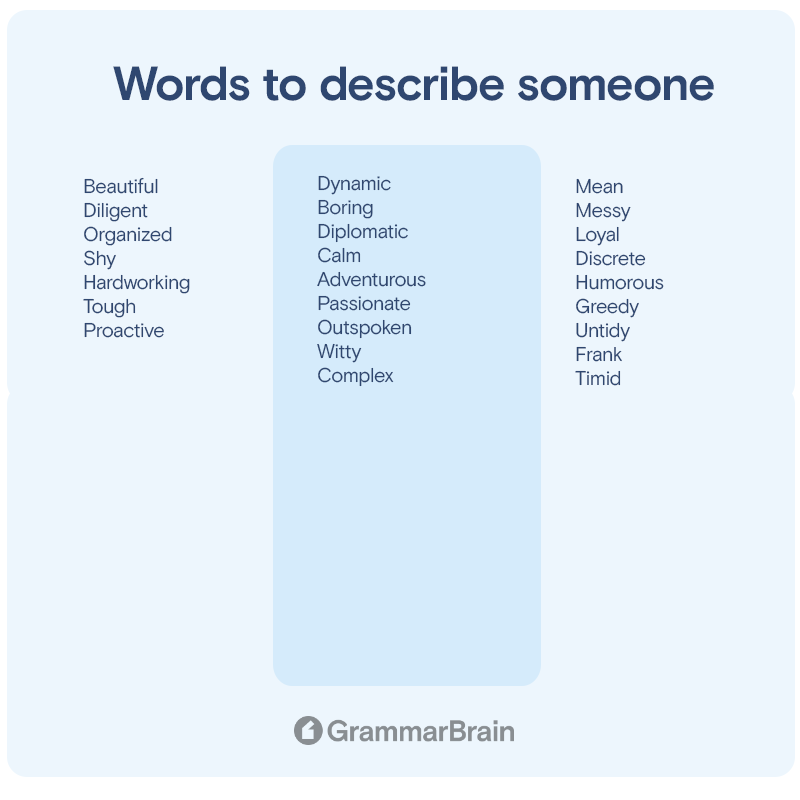
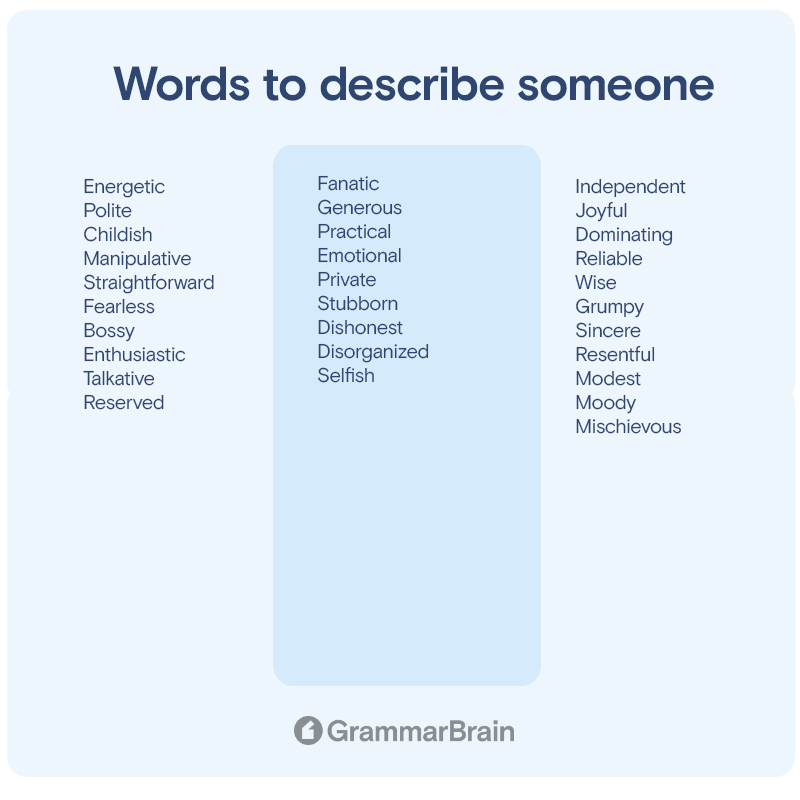
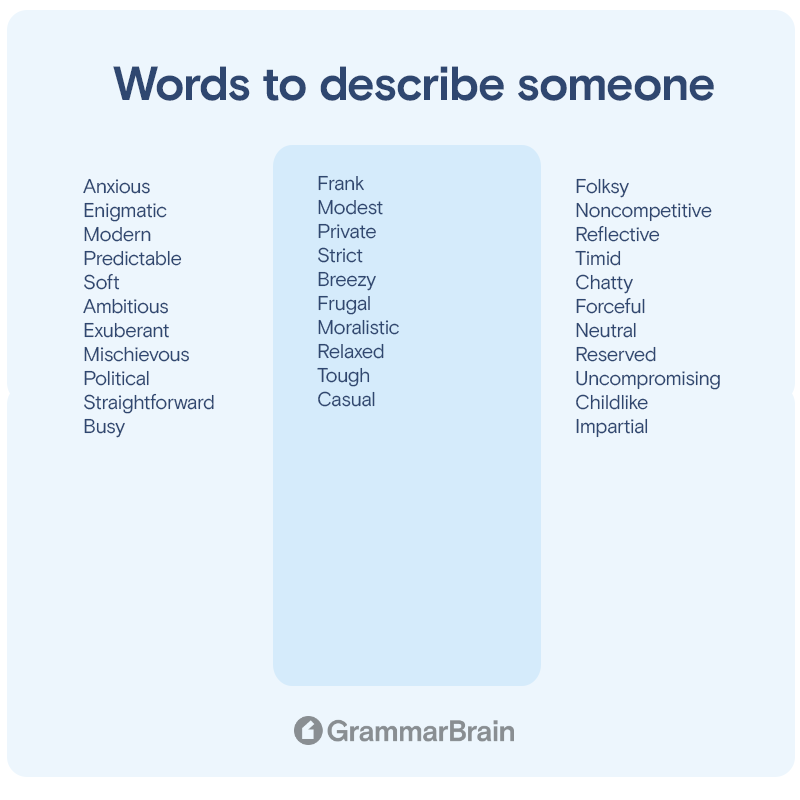
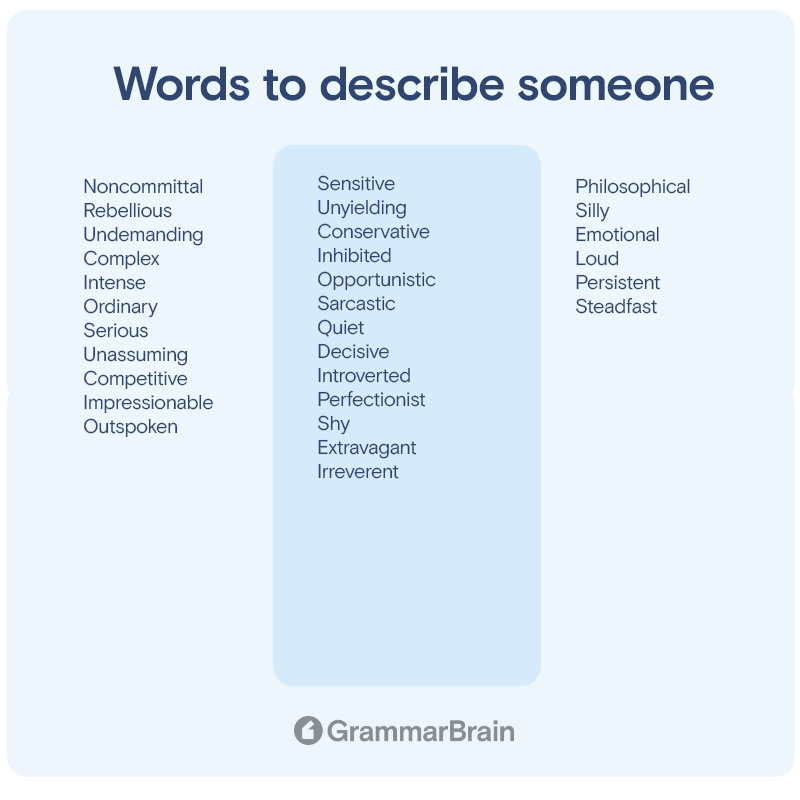
FAQs
What are some positive adjectives?
Beautiful, polite, emotional, loyal.
What are some negative adjectives?
Mean, shy, impulsive, childish, private.
How would you describe a modest person?
Why should we use personality adjectives?
They are helpful to describe other people’s feelings, qualities, emotions, and more. These descriptive adjectives help us be more specific about what we want to communicate.
Sources
- Personality Adjectives: 300+ Great Words to Describe Someone in English
- 206 Personality Adjectives to Describe Anybody
- Adjectives That Describe Personality – Elementary Vocabulary & Grammar
- Positive Personality Adjectives
- Negative Personality Adjectives
- 50 Adjectives To Describe Personality: Find the Most Fitting Word
Inside this article
Fact checked:
Content is rigorously reviewed by a team of qualified and experienced fact checkers. Fact checkers review articles for factual accuracy, relevance, and timeliness. Learn more.
Core lessons
Glossary
- Abstract Noun
- Accusative Case
- Anecdote
- Antonym
- Active Sentence
- Adverb
- Adjective
- Allegory
- Alliteration
- Adjective Clause
- Adjective Phrase
- Ampersand
- Anastrophe
- Adverbial Clause
- Appositive Phrase
- Clause
- Compound Adjective
- Complex Sentence
- Compound Words
- Compound Predicate
- Common Noun
- Comparative Adjective
- Comparative and Superlative
- Compound Noun
- Compound Subject
- Compound Sentence
- Copular Verb
- Collective Noun
- Colloquialism
- Conciseness
- Consonance
- Conditional
- Concrete Noun
- Conjunction
- Conjugation
- Conditional Sentence
- Comma Splice
- Correlative Conjunction
- Coordinating Conjunction
- Coordinate Adjective
- Cumulative Adjective
- Dative Case
- Determiner
- Declarative Sentence
- Declarative Statement
- Direct Object Pronoun
- Direct Object
- Diction
- Diphthong
- Dangling Modifier
- Demonstrative Pronoun
- Demonstrative Adjective
- Direct Characterization
- Definite Article
- Doublespeak
- False Dilemma Fallacy
- Future Perfect Progressive
- Future Simple
- Future Perfect Continuous
- Future Perfect
- First Conditional
- Irregular Adjective
- Irregular Verb
- Imperative Sentence
- Indefinite Article
- Intransitive Verb
- Introductory Phrase
- Indefinite Pronoun
- Indirect Characterization
- Interrogative Sentence
- Intensive Pronoun
- Inanimate Object
- Indefinite Tense
- Infinitive Phrase
- Interjection
- Intensifier
- Infinitive
- Indicative Mood
- Participle
- Parallelism
- Prepositional Phrase
- Past Simple Tense
- Past Continuous Tense
- Past Perfect Tense
- Past Progressive Tense
- Present Simple Tense
- Present Perfect Tense
- Personal Pronoun
- Personification
- Persuasive Writing
- Parallel Structure
- Phrasal Verb
- Predicate Adjective
- Predicate Nominative
- Phonetic Language
- Plural Noun
- Punctuation
- Punctuation Marks
- Preposition
- Preposition of Place
- Parts of Speech
- Possessive Adjective
- Possessive Determiner
- Possessive Case
- Possessive Noun
- Proper Adjective
- Proper Noun
- Present Participle
- Prefix
- Predicate



